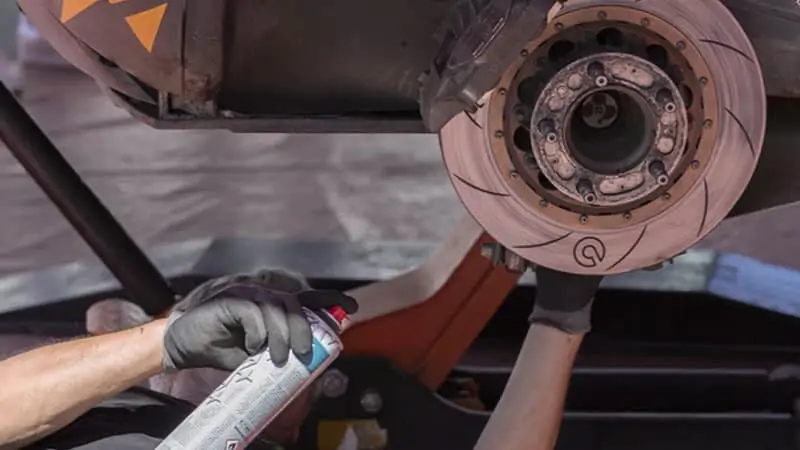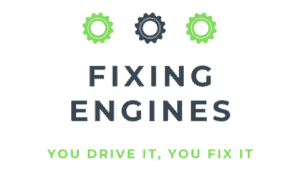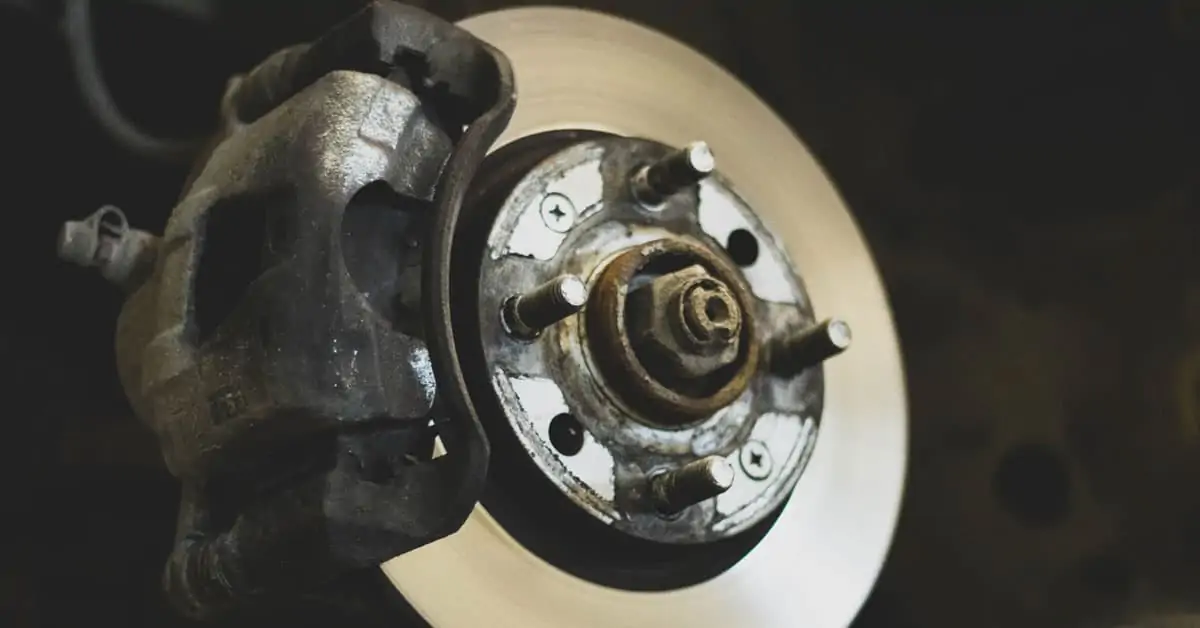Grinding sounds when you’re braking are signs that you shouldn’t ignore. The grinding may get worse the harder you press on the brake pedal. But what should you do if the brakes are grinding?
Grinding brakes are most commonly caused by dirt being inside the brake mechanism. It is common in more extreme weather conditions to find items inside the brakes, causing surfaces to scratch and grind.
If your car’s brakes are currently grinding, the best thing to do is to take a closer look at them or take the car to a mechanic. The solution might be to add brake lubricant, clean the brakes, or replace your car’s brake pads.
We’ll go through the warning signs of failing brakes as well as how to fix common issues. We’ll also look at what is needed to make sure your brakes are operating at peak performance through cleaning and lubrication.
What Are Signs Of Brakes Issues?

The most common warning signs will be that when you press the brake pedal, you will hear a squealing or grinding noise.
Debris and dirt from the road can kick up into the brake mechanism. Rocks and similar can get between the opposing surfaces of the brakes and when you press the brake pedal you will hear a grinding sound.
Road debris anywhere near the calipers can also cause your brakes to apply randomly.
Squealing sounds when using your brakes are indicative of brake pad wear. Inside the brake pads are steel plates. As the brake pad is worn down, the steel is exposed and causes a squealing noise as it contacts the rotors.
As the brake pad is applied, it creates waste material through friction. In drum brakes, due to their enclosed nature, this will build-up to the point of impacting on braking. This is also likely to cause squealing sounds.
Look to the car’s dashboard for warning lights about the brakes. These will display generally as red or yellow, referencing the brake system. These systems use sensors to detect issues with brake pad engagement, heat, or rotor issues.
It’s important to clean accumulated junk, and cleaning properly will often require removing the wheel. This will allow access to the brake system to allow you to disassemble the brakes completely.
In colder climates, road salt and other causes mean rust accumulates on the rotors. Prevention is better than cure for rust, and so ensure that your brakes are checked and remain well lubricated.
The rotors are the large discs that the brake caliper presses on and can easily get out of shape. These defects mean the rotor will touch the brake pads as it rotates, simulating braking and also making noise.
Given the trend with more open alloy wheels, this means the rotors are exposed to the elements. A lack of lubrication can cause rust on the caliper bolts, which will likely lead to scratching.
Just because your brakes are making noise does not necessarily mean something is stuck in them. For example, a rattling sound normally points to thermal expansion with brake pads. A rattling sound is also common when the wrong type of brakes have been installed.
Is Grinding With Car Brakes A Serious Issue?
Brakes are performing a vital function for your car and need to deal with a lot of force. They are assisted in this via lubrication which also serves to protect from road projectiles.
Driving naturally causes this lubricant to be consumed and needs replacing. Wet conditions will quickly wash off this protective coat and invite rust in. Corrosion will spread if there is the inadequate application of brake pad lubricant.
Leaving the car in storage for extended periods can also lead to rust issues. The use of the brakes helps prevent the pads from sticking and fusing. Long periods without use may cause complications.
To ensure a full repair, the whole brake system must be inspected and lubricated. As this can require some advanced car maintenance skills unless you’ve got some help it’s probably the time to get brake service.
As with most aspects of car maintenance, leaving problems to run their course normally just results in bigger issues. Grinding sounds can be signs of the caliper scraping on the rotor, causing it to get bent and require replacement.
Replacing brake pads yourself may cost you $100 in parts. Replacement rotors and calipers are likely going to bring the bill up into the thousands.
How Do I Fix Grinding Brakes?

As the tires will be removed, first get the vehicle up on a hoist. Once you’ve got access to the brake assembly, start to pull the components apart. The pads and other areas must be fully cleaned.
Next do a close inspection of all components including the calipers, pads, rotors, and brake fluid. Make sure the rotor is true and the brake pads are not too worn down.
Apply liberal amounts of Brake Parts Lubricant from Permatex, an easy-to-apply lubricant with a built-in applicator from Amazon.
It’s easy for even small particles of pebbles or sand to cause issues and be missed during a clean. Even a competent mechanic will take a few hours, meaning you should expect to spend at least as long to make sure you get everything.
Rear drum brakes are notoriously difficult to put back together after disassembly for cleaning. Make sure you do model-specific research and follow the tips to make sure it’s done properly.
One area that is often missed by even seasoned mechanics is the brake shims. Brake shims are small pieces of metal attached to the rotors and brake pads. If they fail, you may start to hear grinding noises.
As the brake rotates, the brake shims help even out imperfections on the rotor or pad. As already discussed, it is these types of imperfections that cause the grinding noise while driving.
It is important to ensure that the brake pads you have or will replace your old pads with are compatible. Cheap brake pads are much more likely to make noise and so it’s worth paying extra for a reputable brand.

